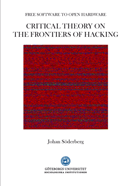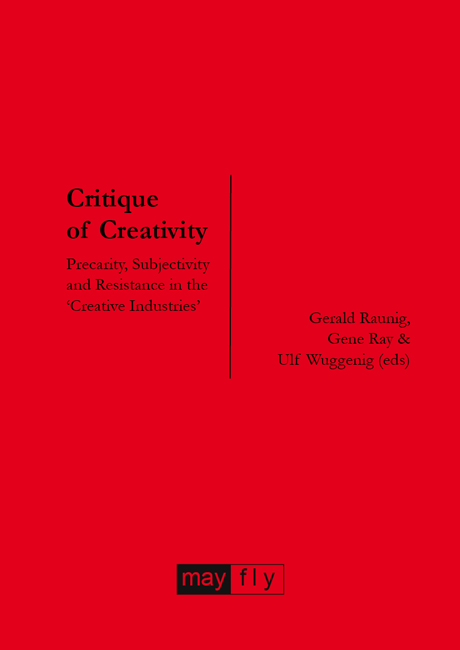Johan Söderberg: Free Software to Open Hardware: Critical Theory on the Frontiers of Hacking (2011)
Filed under thesis | Tags: · critical theory, critique, floss, free software, hacking, hardware, open hardware, software, technology

Starting from the experiences of hackers developing free software and open hardware, this thesis addresses some key and recurrent themes in the field of Science and Technology Studies (STS). It poses the question: how are technologies conceptualised, constructed and used in ways that render some aspects of them transparent, while leaving others opaque? This question is complicated by the fact that what is visible and transparent to some will remain opaque to others, depending on the level of technical expertise commanded. The political implications of this stand at the heart of my inquiry. Since technical know-how is unevenly distributed among groups in society, the same concern can be rephrased as follows: How are relations of power and conflict mediated through technology and relations of technical expertise/ignorance? While trying to address this question, the thesis delves into matters of epistemology. Just as programming skills are required for seeing what is going on behind the computer screen, so theoretically informed reflection can be considered necessary for rendering visible social relations not immediately apparent to the casual eye. Discussion of the actions of hackers is therefore combined in this thesis with discussion of the alternative programmes of research which can be applied to the study of these actions. Two programmes of research in particular receive attention: the critical theory of technology and constructivist science and technology studies (STS). Of these two, the relevance of the former tradition is emphasized and its value for research in the STS field defended. The thesis is composed of four articles and an introductory chapter summarizing and encapsulating my concerns. The first article discusses belief in technological determinism among hackers and how this does not necessarily stand in opposition to political engagement. On the contrary, it is common within hacker politics for contending viewpoints to be articulated in relation to seemingly apolitical narratives about technical neutrality and progress. The second article also deals with antagonistic relations at the heart of processes of technological change. It argues that the punitive actions of law enforcement agencies provide a clear indication of the presence of asymmetrical power relations in technological change through, for example, attempts to suppress filesharing inventions. Hackers are negotiating with legal authorities and the mass media, but also amongst themselves, about how to draw the line between the legitimate users and harmful misusers of technology. The third and fourth articles are based on a case study of a group of Czech hardware hackers who invented a wireless network technology for sending data with visible, red light. The challenges faced by these hardware hackers in their attempts to design technical solutions capable of being built by non-expert users are discussed at length in a theoretically-informed fashion.
PhD thesis
University of Gothenburg, Department of Sociology, March 2011
ISSN: 1650-4437
ISBN: 978-91-975442-7-6
68 pages
Creative Commons: Attribution-ShareAlike
Gerald Raunig, Gene Ray, Ulf Wuggenig (eds.): Critique of Creativity: Precarity, Subjectivity and Resistance in the ‘Creative Industries’ (2007–) [DE, EN]
Filed under book | Tags: · creative industries, creativity, critique, precariat, precarity, resistance, subjectivity

“Creativity is astir: reborn, re-conjured, re-branded, resurgent. The old myths of creation and creators – the hallowed labors and privileged agencies of demiurges and prime movers, of Biblical world-makers and self-fashioning artist-geniuses – are back underway, producing effects, circulating appeals. Much as the Catholic Church dresses the old creationism in the new gowns of ‘intelligent design’, the Creative Industries sound the clarion call to the Cultural Entrepreneurs. In the hype of the ‘creative class’ and the high flights of the digital bohemians, the renaissance of ‘the creatives’ is visibly enacted. The essays collected in this book analyze this complex resurgence of creation myths and formulate a contemporary critique of creativity.”
With contributions by: Brigitta Kuster, Maurizio Lazzarato, Esther Leslie, Isabell Lorey, Angela McRobbie, Raimund Minichbauer, Monika Mokre, Stefan Nowotny, Marion von Osten, Gerald Raunig, Gene Ray, Suely Rolnik, Vassilis Tsianos, Paolo Virno, Ulf Wuggenig
Publisher mayfly, London, in conjunction with the European Institute for Progressive Cultural Policies, 2011
Creative Commons Attribution-Noncommercial-No Derivative Works 3.0 Unported License
ISBN 9781906948139
234 pages
Publisher (new ed., DE)
Publisher (EN)
PDF, PDF, EPUB, EPUB (German, 2007/2016, updated on 2020-11-13)
PDF, PDF (English, updated on 2020-11-13)
Andrew Feenberg: Alternative Modernity: The Technical Turn in Philosophy and Social Theory (1995)
Filed under book | Tags: · critique, modernity, philosophy, social theory, technics, technology

In this new collection of essays, Andrew Feenberg argues that conflicts over the design and organization of the technical systems that structure our society shape deep choices for the future. A pioneer in the philosophy of technology, Feenberg demonstrates the continuing vitality of the critical theory of the Frankfurt School. He calls into question the anti-technological stance commonly associated with its theoretical legacy and argues that technology contains potentialities that could be developed as the basis for an alternative form of modern society.
Feenberg’s critical reflections on the ideas of Jürgen Habermas, Herbert Marcuse, Jean-François Lyotard, and Kitaro Nishida shed new light on the philosophical study of technology and modernity. He contests the prevalent conception of technology as an unstoppable force responsive only to its own internal dynamic and politicizes the discussion of its social and cultural construction.
This argument is substantiated in a series of compelling and well-grounded case studies. Through his exploration of science fiction and film, AIDS research, the French experience with the “information superhighway,” and the Japanese reception of Western values, he demonstrates how technology, when subjected to public pressure and debate, can incorporate ethical and aesthetic values.
Publisher University of California Press, 1995
ISBN 0520089863, 9780520089860
251 pages
PDF (EPUB; updated on 2012-7-31)
Comment (0)
